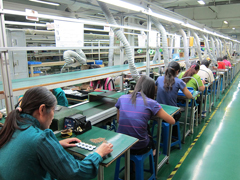This American Life is pretty much always great, but this podcast – covering one man’s journey into the Chinese factories that make our tech products – affected me deeply.
Mr. Daisey and the Apple Factory
 Heartbreaking and fascinating, seriously worth 45 minutes of your life. Stories of extraordinarily long hours, child labor, and repetitive stress injuries that make our own seem like hangnails in comparison. Stories of people assembling parts as small as human hairs by hand for 16 hours at a stretch, stories of people working with their hands until their bones simply crumble (and they’re out of work for life). Stories of experiments with neurotoxins like hexane being done on unwitting human workers. It goes on and on.
Heartbreaking and fascinating, seriously worth 45 minutes of your life. Stories of extraordinarily long hours, child labor, and repetitive stress injuries that make our own seem like hangnails in comparison. Stories of people assembling parts as small as human hairs by hand for 16 hours at a stretch, stories of people working with their hands until their bones simply crumble (and they’re out of work for life). Stories of experiments with neurotoxins like hexane being done on unwitting human workers. It goes on and on.
But listen through to the last ten minutes, where the emotional impact, and the anger the story generates, Â is sort of qualified by observations of economic realities in China: “Hundreds of thousands of Chinese choose the grimness of factory life over the grimness of the rice paddies.”
I remember when the suicide nets went up around the Foxconn factory, and the simplistic reactions people had to their existence. But some perspective helps – the truth is, China as a whole has one of the highest suicide rates in the world, while those rates are actually lower in factory cities like Chengdu than they are in the rest of the country. And Foxconn is doing the right thing by trying to prevent them – that’s a good thing, not an example of Foxconn simply accepting suicide as a cost of doing business.
But while Apple is  a sexy centerpoint for the story, it’s important to remember that this isn’t really a story about Apple – virtually every single technology product we buy, from DVD players to smartphones to game consoles to blenders, is made under similar conditions.
Actually, this isn’t even a story about the human cost of our enjoyment of technology. Virtually everything on the shelves at Walmart and Target is made in China. The clothes on your back, that car you drive… chances are high those things were made in conditions that are similar or worse than those at Foxconn. It’s not about Apple – it’s about us (ZDNet’s Larry Dignan does a good job widening the scope of the story in this post).
The popularity of this story is an opportunity for the west to reflect on the implications of its addiction to cheap products in general. We’ve grown into  a dangerous symbiotic relationship with China – we can’t shake the allure of cheap products, and they can’t shake the allure of jobs for their citizens. Your cheap jeans create jobs for peasants. And if we were somehow to bring those jobs back to the U.S., we would be throwing those peasants back into the poverty they’ve partially escaped in the past decade. Reality is messy.
Coupled with a recent NY Times piece covering the same topic, it’s been a hard week for Apple, who are scrambling to do spin control. But whether this is an Apple problem or a larger problem of our addiction to cheap goods, Apple could be stepping up as a leader in making a difference here. With the company’s insane bankroll, they could and should be doing more to affect manufacturing conditions.
What about you? Would you be willing to pay 50% more for an iPhone or an HP laptop if it meant you knew it was made in the U.S., under different conditions?
